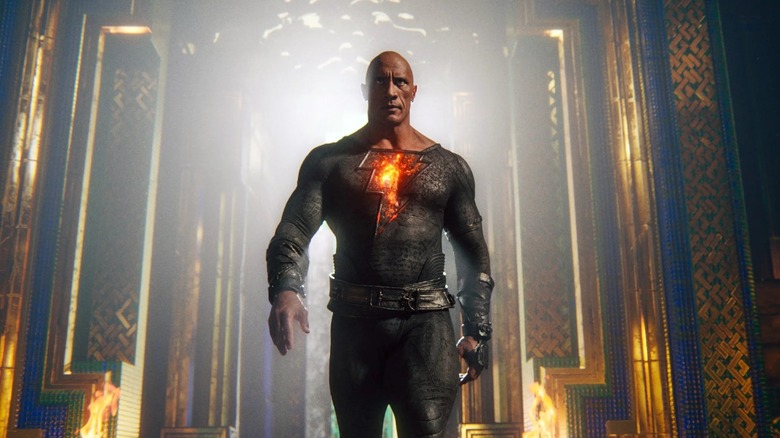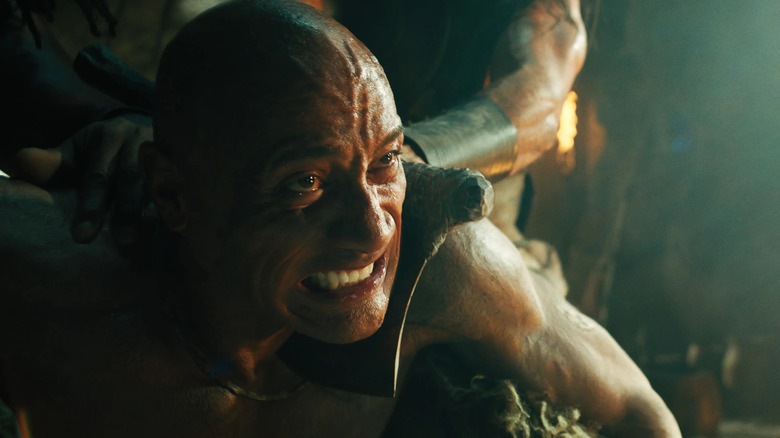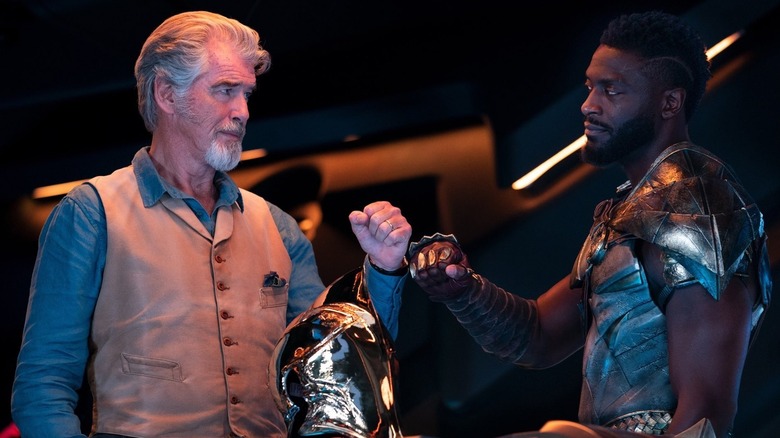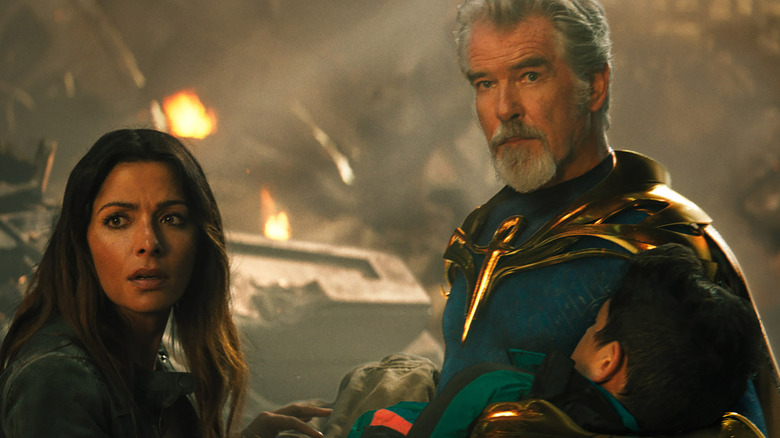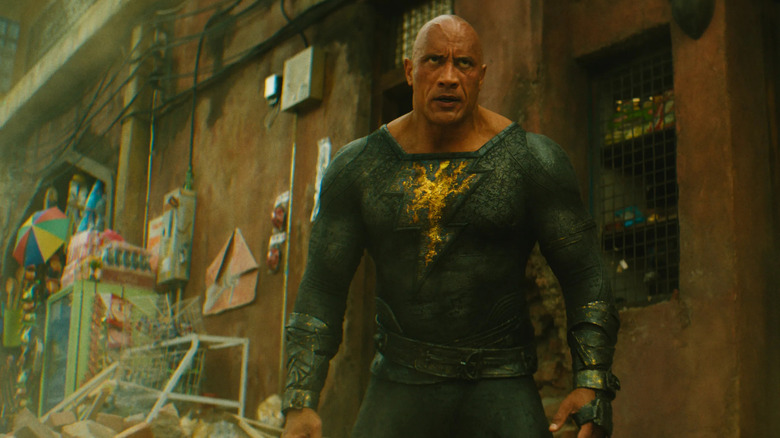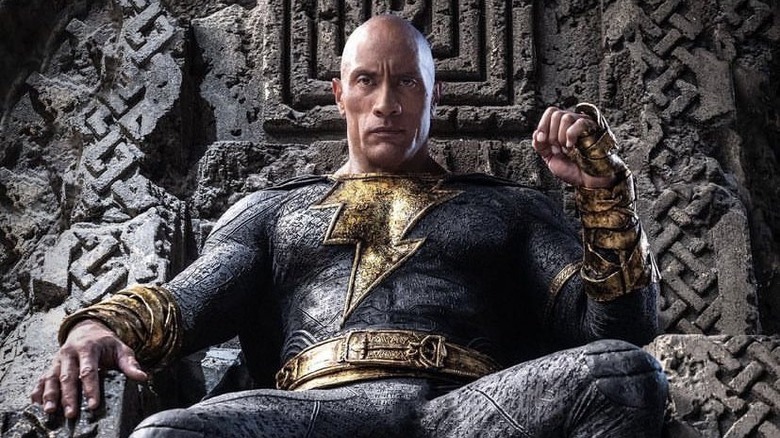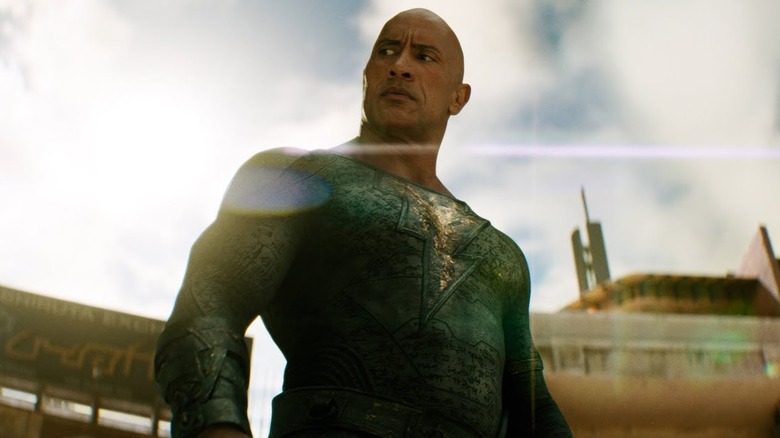Black Adam Ending Explained: Holding Out For A Hero
We have reached the end of a very long journey, DC fans. "Black Adam" has finally arrived in theaters, bringing an epic 15-year saga to its conclusion (or perhaps beginning?) for Dwayne "The Rock" Johnson. The man became attached to the role back in 2007 and, at long last, he has brought Teth Adam to life on the big screen for the first time in the character's history. So, how did it go?
Today, we're going to go over the movie briefly, but mostly focus on the ending and what it means for the character in the DCEU, and, broadly speaking, what it means from an analytical standpoint. And, not to show my hand here, but does it have anything hiding underneath the surface at all? Or is this truly just an antihero origin story? Let's dig in.
Warning: this post contains major spoilers for "Black Adam." Proceed with caution.
A brief recap
The plot of director Jaume Collet-Serra's "Black Adam" is not all that complicated. The country of Khandaq has been under some form of oppressive rule for thousands of years, with legends of a hero who once saved the country's people from that oppression. Adrianna Tomaz (Sarah Shahi) and her band of rebels are on the hunt for a powerful relic, the Crown of Sabbac, in modern day Khandaq to prevent the country's current oppressors, Intergang, from obtaining it and unleashing its powers. Adrianna ends up finding the tomb housing that crown with Ishmael (Marwan Kenzari), who she believes to be an ally. As we eventually come to find, he's actually the descendent of the former king of Khandaq and intends to steal the crown to take back the country for his bloodline.
But as things go south in the tomb, Adrianna unleashes what she thinks to be the country's protector. And while the super-powered being who emerges does lay waste to the bad guys, Teth Adam is not the hero they were promised. He goes on a rampage, killing all of the bad guys but causing havoc along the way. While Khandaq's people quickly take his side, this gets the attention of Amanda Waller (Viola Davis), who you may know from the "Suicide Squad" movies. She then calls in the Justice Society, led by Hawkman (Aldis Hodge) to stop Adam before he simply becomes too powerful to stop.
They got him instead
And so, Hawkman, Doctor Fate (Pierce Brosnan), Cyclone (Quintessa Swindell), and Atom Smasher (Noah Centineo) head to Khandaq to try and get Adam to utter the phrase Shazam so that his powers will be contained. Yes, Adam was gifted the powers by the same wizards who gave Billy Batson his powers in "Shazam!" Well, kind of. As we later discover, Adam's son, Hurut, was Khandaq's true savior but gave his powers to his father to save his life, only for Hurut to die at the hands of the king's army moments later. Hence, Teth Adam becomes a rage-filled atom bomb with god-like powers that nearly levels Khandaq with his anger, and the wizards entombed him to keep that power contained. Until Adrianna came along, that is.
The key to the whole thing is that Adrianna's son, Amon (Bodhi Sabongui), has been holding out hope for Khandaq's very own superhero his whole life. So when Adam emerges, despite his willingness to kill and utter lack of desire to be a hero, Amon is determined to help him see what he can become. This all goes south when Ishmael takes Amon captive in an attempt to steal the crown, made all the more tricky because the Justice Society and Adam are still not seeing eye to eye. But they reluctantly opt to work together, forming an uneasy alliance, so that they can save Amon. And, more importantly, stop Ishmael.
Changing the future
It's relatively standard high-stakes, third-act superhero movie stuff, only slightly muddied because of Adam's operation in the gray. He has no compunction about killing people, whereas the Justice Society are all about trying to keep the peace. For better or for worse, the idea is to illustrate the difference between seemingly idealistic heroes and a powerful being with a less rigid code of ethics.
In getting Amon back, Ishmael manages to summon the crown's power by dying and having the literal demons of the underworld turn him into Sabbac, who is intended to rule over Khandaq and turn it into Hell on Earth on their behalf. But after things go south in saving Amon, Adam reveals to Hawkman his true backstory and offers to say Shazam and surrender. They take him to a secret Task Force X prison in the middle of nowhere, leaving Sabbac to go unchecked. Much like the Justice Society couldn't defeat Adam, they can't defeat Sabbac either. Doctor Fate knows this and uses his mystical powers to hold off the demon and simultaneously communicate with Adam, encouraging him to unleash his might to save Khandaq.
The idea seems to be that Doctor Fate, aka Kent Nelson, is changing the future as he had foreseen it, recognizing that Adam may not be a hero, but that he can be what the world needs at that very moment. Heroes can come in many shapes and sizes and, in this case, the world needs a brutal antihero.
Not a king, but a protector
The final confrontation is very much standard superhero stuff. The remaining members of the Justice Society rally after Fate's epic death, Adam has a vision that leads him to see he's not cursed with his powers and that they can be a gift. This leads him back to Khandaq to finally set aside his differences with Hawkman and, with their powers combined, they are able to defeat Sabbac. Khandaq is saved! This also leads the Justice Society to leave Adam alone and let him stay out of prison.
But what of the throne? Who will rule over Khandaq? While Adrianne and Amon point Adam to the throne, the second he sits on it, he realizes his place is not as king. So, he destroys the throne, thereby essentially signaling the end of the oppression of Khandaq's people. Much like Adam's ways of dealing with bad guys, this is not a subtle metaphor. But Adam vows that he will, instead, be Khandaq's protector. Not a hero, exactly, but a powerful being who has no tolerance for oppression.
What much of the movie wrestles with is the idea of a hero's journey, which is something audiences are very familiar with up to this point. By placing that hero's journey on the shoulders of an antihero with a dark backstory, DC is attempting to do something different with "Black Adam," who only gets that name in the film's closing seconds before the credits role, not unlike how "Iron Man" ended back in 2008. In the end, how did that pan out?
The antihero's plainly spelled out journey
The Rock is one of the biggest stars on the planet and it's easy to see why the idea of a "Black Adam" solo movie became attractive at a certain point. But let's remember that he is historically a villain in the comics who, at times, takes on more of an antihero role. He's not out-and-out bad like the Joker, but he sure as heck ain't Superman. This character was supposed to be the villain in "Shazam!" He wasn't supposed to be the center of a big, solo superhero film like this.
In attempting to balance what is, on some level, expected from a superhero origin story while also playing with the antihero of it all, we end up with something that operates pretty much on the surface the whole way through.
Not much beneath the surface
I'm not, admittedly, the most analytical guy on the planet. I watch stuff and try to like stuff. In the case of this movie, everything it has to say is right there on front street. The journey is as it exists. The ending of the movie is just that — the end of this movie. It's, in many ways, the beginning of Black Adam's journey in the DCEU and, in that way, it feels like a big, expensive origin story for things to come later. But there's nothing to be missed and not all that much hiding beneath the surface here. This movie lays it all out there and is about as mysterious as what's hiding behind a freshly cleaned window in broad daylight.
Now, is that inherently a bad thing? Is it a bad thing that everything about "Black Adam" was said in the trailers and that it's all about a guy who doesn't mind using his powers to kill people — who isn't a hero but isn't evil either? That, by the end, he's just that guy with a touch of accepted responsibility due to a reframing of his tragic past. Not necessarily, but those looking for something richer, I regret to inform you this is not that kind of movie. It's a blunt object of a film that does what it sets out to do. The ending of this film is like the end of a ride. It's over. The only thing left to discuss is, what is next? A funnel cake or another ride, perhaps.
"Black Adam" is in theaters now.
